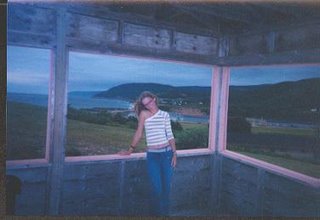Throughout my chemotherapy treatments, as I mentioned so many times before, I acquired what I refer to as "tunnel vision." I had one and only one thing in mind- getting this damned treatment OVERWITH so I could get on with my life. But little did I realize at that time that the end of chemotherapy did not mark the end of my battle with cancer. After chemo, I was faced with a comepletely new side of cancer -- the aftermath of the diagnosis and treatment. A new battle was just beginning.
Three weeks following my final chemo treatment, I was nothing but enthusiastic and hopeful. I hoped to be able to work within a couple of months, I hoped to be able to socialize again, I hoped to be able to do normal things with my boyfriend, I hoped to feel good once again, I hoped that I would never have to deal with cancer again. I wanted my life back. Period. Thus, as soon as I began to feel better I began doing all things I could to make this happen. By April (just a month after chemo) Mike and I began looking for an apartment, I placed myself on the substitute teacher list with the Cape Breton Victoria Regional School Board, I started working out a lot, and I began to gradually make my way back into the 'social butterfly mode' that was once a definitive aspect of my life. I told the goverment that I would no longer be needing their assistance financially and convinced myself that I could handle working enough to get by until I was feeling 100% again.
But even after I gathered up some of the normal parts of my former life, I was not happy. In May and June I felt extremely depressed. I felt like I was surrounded by darkness and could not escape it. I was experiencing mood swings which were negatively affecting my relationship with Michael. I had suffered a major blow in self-esteem-- I went from being a confident, outgoing woman to what seemed like a self-conscious, insecure baby. I was constantly worrying about my health.
What is that pain? Could it be cancer? Could this shortness of breath mean that chemo ruined my lungs? I have a headache--maybe I have a brain tumor! Is this a lump? Is that a lump? In addition to feeling insecure about my general health, I felt that I no longer had the stamina I once enjoyed. I worked for one full week teaching P-6 music and band and I felt like someone had literally beat me up by the end of the week. I was so tired I could literally not move my body. This was fatigue working at its finest. And this was something I had never experienced before. I was always a very energetic person who barely sat down for 5 minutes-- work used to define my life. Now I couldn't handle working for one week.
In addition to all of these road blocks, I felt that there was something major underlying the stress I was experiencing. I later came to realize that this source of stress was the expectations that others were placing on me, although I know that no one caused this intentionally. Regardless, I felt that once I finished treatment everyone thought that my battle with cancer was over. Perhaps this had a great deal to do with the fact that I attempted to move on too quickly and appeared to be back to "normal" to many people. Nonetheless, people thought everything was now fine and that they could to some extent forget about all that happened to me. But while they were forgetting, I was clearly remembering-- alone. I began to feel alienated--like no one understood what I was going through. And, because people thought I was back to "normal," I felt an underlying pressure to have to work, party, and do all the things that everyone normally does, more than I felt that I could handle. I felt that I was "over-doing it" physically and mentally and I became extremely scared that this was interfering with the healing process.
Why did I do this to myself? Why did I try to move on so quickly? Am I going to get sick again? All of these thoughts haunted me. But, at the same time, I heard the haunting voices of friends and family saying: "You don't have cancer anymore" and "I think its time to move on."
Feelings of anger and self-pity brewed within me because of both the expectations I placed on myself and the expectations others placed upon me. I knew I could not live up to either requests. It was time, then, to begin respecting myself and my limitations and to change my expectations. It was also time to turn a deaf ear the haunting voices of others.










































